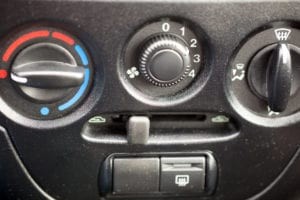Does using the car heater use gas? Yes, but the impact is more nuanced than you might think! CARS.EDU.VN is here to demystify car heating systems, how they work, and their effect on your fuel economy. We’ll dive deep into the science behind it all, separating fact from fiction, and providing you with practical advice to optimize your car’s performance.
1. Understanding How Your Car Heater Works
Your car’s heating system isn’t as simple as flipping a switch. It’s an intricate process that leverages the engine’s natural heat. This process is essential for understanding fuel consumption factors, engine efficiency, and climate control.
1.1 The Engine’s Heat: A Byproduct Put to Good Use
Internal combustion engines generate a significant amount of heat as they burn fuel. Instead of letting all that heat dissipate into the atmosphere, your car’s cooling system captures it. This redirected heat becomes valuable for passenger comfort.
1.2 Coolant Circulation: The Heat Delivery System
The engine coolant plays a vital role, circulating through the engine block to absorb heat. It then flows to the heater core, a small radiator-like component located inside the dashboard. The cooling system thermostat ensures efficient temperature regulation.
1.3 The Heater Core: Your Personal Radiator
The heater core emits the heat into the passenger compartment. A fan blows air across the heater core, and that heated air is directed through the vents. The evaporator housing and blend door system control air flow to optimize temperature.
 heater core
heater core
1.4 Key Components: A Quick Recap
- Engine: Generates heat through combustion.
- Coolant: Absorbs and transfers heat.
- Water Pump: Circulates the coolant.
- Heater Core: Radiates heat into the cabin.
- Blower Fan: Pushes air across the heater core.
- Blend Door: Controls the mix of hot and cold air.
2. The Great Debate: Does the Heater Impact Fuel Economy?
This is where the “Does Using The Heater In The Car Use Gas” question gets interesting.
2.1 The Indirect Connection: Tapping into Existing Energy
Unlike the air conditioner, which requires the engine to power a compressor, the heater utilizes “waste” heat. So, it doesn’t directly require extra fuel. This sets it apart from energy-intensive components like the AC compressor.
2.2 A Minimal Impact: Less Drain Compared to Air Conditioning
Using the heater generally has a much smaller impact on fuel economy than using the air conditioner. The AC system forces the engine to work harder.
2.3 The Fan Factor: A Small Electrical Draw
The blower fan does draw power from the car’s electrical system, which is ultimately powered by the engine. However, the energy consumption of the fan is relatively low compared to other systems. Fan speed and blower motor efficiency influence electrical drain.
2.4 Idling and Warm-Up: Where Fuel Consumption Matters
Letting your car idle for an extended period to warm up the engine can waste fuel. The engine works harder when cold, which affects fuel efficiency. Fuel consumption and emissions increase during idling, impacting overall economy.
3. The Air Conditioning Contrast: Understanding the Difference
To truly appreciate the heater’s impact, it’s helpful to compare it to the air conditioning system.
3.1 The AC Compressor: A Major Energy Consumer
The air conditioner relies on a compressor to circulate refrigerant, which cools the air. This compressor is driven by the engine, placing a significant load on it. Compressor efficiency is a critical factor in AC system performance.
3.2 Fuel Efficiency Reduction: A Noticeable Difference
Using the air conditioner can reduce fuel efficiency by as much as 10-20%, especially in city driving. Factors like driving conditions, AC settings, and vehicle type contribute to fuel efficiency reduction.
3.3 Hybrid and Electric Vehicles: A Different Story
In hybrid and electric vehicles, the air conditioning system can have an even more pronounced impact on range, as it draws power from the battery. Energy management systems in EVs optimize AC usage for efficiency.
4. Diagnosing Heater Problems: When the Warmth Disappears
If your car’s heater isn’t working properly, it’s essential to diagnose the issue.
4.1 Common Culprits: Low Coolant, Thermostat Issues, and More
- Low Coolant: Prevents proper heat transfer.
- Faulty Thermostat: Can prevent the engine from reaching operating temperature.
- Clogged Heater Core: Restricts coolant flow.
- Blend Door Actuator Failure: Prevents proper mixing of hot and cold air.
- Blower Motor Issues: Reduces airflow.
4.2 Burning Smells and Cold Air: Warning Signs
A burning smell could indicate a coolant leak, while blowing cold air could point to a thermostat or heater core problem. Addressing these issues promptly can prevent further damage and ensure your comfort.
4.3 Professional Inspection: When to Seek Expert Help
If you’re not comfortable diagnosing the problem yourself, it’s best to take your car to a qualified mechanic for inspection and repair. Professional technicians have the tools and expertise to accurately diagnose and fix heater problems. Contact CARS.EDU.VN at 456 Auto Drive, Anytown, CA 90210, United States, or Whatsapp: +1 555-123-4567 for trusted local service recommendations.
5. Tips for Maximizing Fuel Efficiency in Winter
While the heater itself may not be a major fuel drain, there are several steps you can take to optimize fuel efficiency during the colder months.
5.1 Avoid Excessive Idling: Warm-Up Strategies
Instead of letting your car idle for a long time, start driving gently after a brief warm-up period. The engine will warm up faster under load, and you’ll save fuel.
5.2 Tire Pressure: Maintaining Optimal Inflation
Cold weather can cause tire pressure to drop, increasing rolling resistance and reducing fuel efficiency. Check your tire pressure regularly and inflate to the recommended level.
5.3 Engine Maintenance: Tune-Ups and Fluid Checks
A well-maintained engine runs more efficiently. Regular tune-ups, oil changes, and fluid checks can help optimize fuel economy.
5.4 Reducing Drag: Removing Snow and Ice
Excess snow and ice can increase drag, forcing the engine to work harder. Clear your car of snow and ice before driving.
5.5 Planning Routes: Avoiding Stop-and-Go Traffic
Stop-and-go traffic consumes more fuel than steady highway driving. Plan your routes to avoid congested areas whenever possible.
6. The Science of Automotive Heating Systems
Understanding the underlying principles can give you a deeper appreciation for how your car’s heating system works.
6.1 Thermodynamics: The Laws of Heat Transfer
The heating system relies on the principles of thermodynamics, particularly heat transfer. Heat naturally flows from hotter objects to cooler objects, and the heater core facilitates this process.
6.2 Heat Exchangers: Efficiently Transferring Energy
The heater core is a type of heat exchanger, designed to efficiently transfer heat from the coolant to the air. The design and materials of the heat exchanger influence its efficiency.
6.3 Coolant Properties: Optimizing Heat Capacity
The properties of the coolant, such as its heat capacity, affect its ability to absorb and transfer heat. Using the recommended coolant type is crucial for optimal performance.
6.4 System Efficiency: Minimizing Heat Loss
Engineers strive to design heating systems that minimize heat loss and maximize efficiency. Insulation, airflow management, and component placement all play a role.
7. Heater Technology: Innovations in Comfort and Efficiency
Automotive heating systems have evolved over time, with new technologies aimed at improving comfort and efficiency.
7.1 Electric Heaters: Quick Warm-Up in Electric Vehicles
Electric vehicles often use electric heaters to provide cabin heat, as they don’t have an internal combustion engine. These heaters can provide instant heat, but they do draw power from the battery.
7.2 Heat Pumps: Reversible Air Conditioning
Some vehicles use heat pumps, which are essentially reversible air conditioners. Heat pumps can provide both heating and cooling, and they are more energy-efficient than traditional electric heaters.
7.3 Zonal Heating: Targeted Comfort
Zonal heating systems allow you to control the temperature in different areas of the car. This can improve comfort and reduce energy consumption by only heating the areas that need it.
7.4 Waste Heat Recovery: Maximizing Efficiency
Some advanced systems are designed to recover even more waste heat from the engine, further improving efficiency. These systems can capture heat from the exhaust or other components.
8. Real-World Testing: Quantifying Fuel Consumption Differences
While the heater’s impact may be small, it’s helpful to see real-world data.
8.1 Independent Studies: Measuring Fuel Economy Changes
Several independent studies have measured the impact of using the heater and air conditioner on fuel economy. These studies typically show a smaller impact from the heater compared to the AC.
8.2 Driving Conditions: A Significant Variable
Driving conditions, such as temperature, speed, and traffic, can significantly influence fuel economy. It’s important to consider these factors when interpreting test results.
8.3 Vehicle Type: Variations in Efficiency
Different vehicle types have varying levels of fuel efficiency. Larger vehicles with less efficient engines may experience a more noticeable impact from using the heater or air conditioner.
8.4 Long-Term Data: Tracking Fuel Consumption Over Time
Tracking your fuel consumption over time can provide valuable insights into how different factors affect your fuel economy. This can help you identify patterns and adjust your driving habits accordingly.
9. Debunking Myths: Separating Fact from Fiction
There are many misconceptions about car heating systems and their impact on fuel economy.
9.1 Myth: The Heater Doesn’t Use Any Gas
While the heater uses “waste” heat, it’s not entirely free. The engine still needs to run to generate that heat, so there is an indirect connection to fuel consumption.
9.2 Myth: The Heater Will Drain Your Battery
The heater itself won’t drain your battery, but the blower fan can if left on for an extended period with the engine off. Modern vehicles often have battery protection systems that prevent excessive drain.
9.3 Myth: It’s Better to Idle Than to Drive Cold
Idling for extended periods is generally less efficient than driving gently after a brief warm-up. Modern engines are designed to warm up quickly under load.
9.4 Myth: All Heaters Are Created Equal
Different vehicles have different heating systems, and some are more efficient than others. Factors like heater core size, blower fan efficiency, and system design can all influence performance.
10. CARS.EDU.VN: Your Trusted Resource for Automotive Information
At CARS.EDU.VN, we’re dedicated to providing you with accurate, reliable information about all aspects of car ownership. We understand the challenges car owners face, from finding trustworthy repair services to understanding complex automotive systems.
10.1 Expert Advice: Trusted Mechanics and Technicians
Our network of experienced mechanics and technicians can provide you with expert advice and guidance. We can help you find qualified professionals in your area who can diagnose and repair any issues with your car.
10.2 Comprehensive Guides: Maintenance Tips and Troubleshooting
We offer comprehensive guides on a wide range of topics, including maintenance tips, troubleshooting advice, and detailed explanations of automotive systems. Our guides are designed to be easy to understand and practical, so you can take better care of your car.
10.3 In-Depth Reviews: Vehicle Comparisons and Technology Updates
Our in-depth reviews and comparisons can help you make informed decisions when buying a new or used car. We also provide updates on the latest automotive technologies and trends, so you can stay ahead of the curve.
10.4 Local Services: Finding Reliable Repair Shops
Finding a reliable repair shop can be a daunting task. CARS.EDU.VN can help you locate trusted service providers in your area. We verify their credentials and customer feedback to ensure you receive quality service.
Don’t let car troubles get you down. Visit CARS.EDU.VN today for reliable information, expert advice, and trusted local services. Contact us at 456 Auto Drive, Anytown, CA 90210, United States, or Whatsapp: +1 555-123-4567.
FAQ: Heating Systems and Fuel Consumption
Here are some frequently asked questions about car heating systems and their impact on fuel consumption:
- Does using the car heater use gas? Yes, indirectly. It uses waste heat from the engine, which requires fuel to run.
- Is it better to use the heater or air conditioner for fuel economy? The heater is generally more fuel-efficient than the air conditioner.
- Can a faulty thermostat affect my car’s heater? Yes, a faulty thermostat can prevent the engine from reaching operating temperature, reducing heater performance.
- Does the car heater drain the battery? The heater itself does not drain the battery, but the blower fan can if left on for an extended period with the engine off.
- How can I improve my car’s fuel economy in winter? Avoid excessive idling, maintain proper tire pressure, and keep your engine well-maintained.
- What are the common problems that can cause a car heater to stop working? Low coolant, a faulty thermostat, a clogged heater core, or a blower motor issue.
- Do electric cars use the same type of heating system as gasoline cars? No, electric cars often use electric heaters or heat pumps.
- Is it necessary to warm up my car before driving in cold weather? Modern cars warm up quickly under load, so a brief warm-up is usually sufficient.
- Does the size of my car affect how much fuel the heater uses? Larger cars with less efficient engines may experience a more noticeable impact from using the heater.
- Where can I find a trusted mechanic to diagnose and repair my car’s heating system? Visit cars.edu.vn to find reputable service providers in your area.

